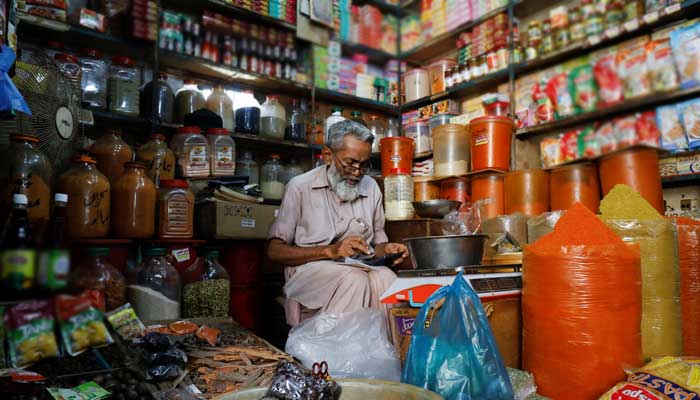July inflation eases, but Covid curbs risk stoking prices
CPI inflation clocked in at 8.4 percent in July 2021 against June reading of 9.7 percent and 9.3 percent in July 2020
ISLAMABAD: Consumer price index (CPI) eased in July as food costs rose slowly, but a lockdown to contain the raging coronavirus in the country's financial hub risks creating supply bottlenecks that could fuel price pressures in coming months.
CPI inflation clocked in at 8.4 percent in July 2021 against June reading of 9.7 percent and 9.3 percent in July 2020, Pakistan Bureau of Statistics (PBS) data showed on Monday. Analysts said increased food prices, quarterly house rent adjustment and twice hike in domestic petroleum products prices kept inflationary pressure.
Core inflation remained flat at 6.9 percent year-on-year as compared to 7.0 percent year-on-year in June 2021 with urban and rural core inflation rising by an identical 6.9 percent year-on-year/ Moreover, urban and rural CPI arrived at 8.7 percent and 8.0 percent year-on-year in July 2021versus 9.7 percent registered in June 2021.
It is to be noted that in July, the government increased prices of petroleum products twice, with an accumulative increase of Rs7.4/litre in petrol, Rs3.98 in diesel, Rs5.25 in kerosene and Rs4.99/litre in light diesel oil (LDO). Besides, liquefied petroleum gas (LPG) prices have also been increased.
Prices of two major contributors to CPI basket, including food having 34.58pc share followed by utility charges – housing, water, electricity, gas and fuels – holding 23.63 percent share, increased sizably, adding to the inflation numbers. Transportation charges also increased the highest.
The 1.8 percent month-on-month jump in food prices almost completely offset the decline of 1.8 percent month-on-month recorded last month. The increase was led by high prices of onions and tomatoes.
Pakistan has targeted to contain inflation to eight percent in FY22 given higher forecast of international oil prices, but has excluded the impact of increase in electricity tariff. Analysts said high international commodity prices and fast depreciating rupee value (6.3 percent since March 2021) could exert upward pressure in the upcoming period.
However, high base effect is expected to partially limit this rise. Analysts said if electricity tariff was increased as per the International Monetary Fund (IMF) requirement, the average CPI would move beyond 9 percent in the current fiscal.
According to the CPI basket, on average, each Pakistani spends 34.58 percent of his income on food and beverages, 23.63 percent on house rent, water, gas, electricity and fuel, 8.6 percent on clothing and footwear; 6.92 percent on hoteling, 5.91 percent on transportation, 4.1 percent on furnishing and household equipment maintenance, 3.79 percent on education, 2.7 percent on health, 2.21 percent on communication, with the lowest 1.59 percent spent on recreation and culture.
Food inflation in July 2021 stood at 8.24 percent, transportation charges increased by10.5 percent, housing, water, electricity, gas and fuel 9.17 percent, furnishing and household equipment maintenance charges went up 9.79 percent, clothing and footwear 9.47 percent, health charges 8.61 percent, hoteling 8.5 percent, recreation and culture 5.91 percent and education 2.04 percent over the corresponding month of last year.
Interestingly, wholesale price index (WPI) on YoY basis has fast increased to 17.3 percent in July 2021 as compared to an increase of 20.9 percent a month earlier and an increase of 3.2 percent in July 2020.
WPI inflation on MoM basis increased 2.3 percent in July 2021 as compared to an increase of 0.9 percent a month earlier, and 5.4 percent increase in July 2020. Keeping in view the high reading of WPI, CPI might increase in the coming months.
-
 Gigi Hadid Feels 'humiliated' After Zayn Malik's 'pathetic' Comment: Source
Gigi Hadid Feels 'humiliated' After Zayn Malik's 'pathetic' Comment: Source -
 Olympics Men Hockey Game: McDavid, Crosby Power Canada Past Czechia
Olympics Men Hockey Game: McDavid, Crosby Power Canada Past Czechia -
 Sony PlayStation State Of Play Reveals 'Castlevania' And 'Metal Gear' Return
Sony PlayStation State Of Play Reveals 'Castlevania' And 'Metal Gear' Return -
 Ontario Tuition Freeze Ends, Allowing Colleges And Universities To Raise Fees
Ontario Tuition Freeze Ends, Allowing Colleges And Universities To Raise Fees -
 King Charles Should Apologise To All Rape Victims, Says New Poll
King Charles Should Apologise To All Rape Victims, Says New Poll -
 Cardi B Shares Emotional Message Amid Stefon Diggs Split Rumors
Cardi B Shares Emotional Message Amid Stefon Diggs Split Rumors -
 James Van Der Beek’s 'heartbroken' Ex Wife Breaks Silence Of His Death
James Van Der Beek’s 'heartbroken' Ex Wife Breaks Silence Of His Death -
 Sarah Ferguson, Shamed Andrew Spotted In ‘family Costume Drama’
Sarah Ferguson, Shamed Andrew Spotted In ‘family Costume Drama’ -
 Kylie Kelce Reveals Why She Barely Planned Her Wedding Day?
Kylie Kelce Reveals Why She Barely Planned Her Wedding Day? -
 Why Shamed Andrew Called His Victims ‘Mrs Windsor’
Why Shamed Andrew Called His Victims ‘Mrs Windsor’ -
 Kate Hudson Explains Why Acting Isn't Discussed At Home
Kate Hudson Explains Why Acting Isn't Discussed At Home -
 Prince William, Kate Middleton Epstein Statement Was AI Generated, Says Expert
Prince William, Kate Middleton Epstein Statement Was AI Generated, Says Expert -
 Sarah Ferguson On Her Way To Hurt 'only Two People Who Care About Her'
Sarah Ferguson On Her Way To Hurt 'only Two People Who Care About Her' -
 World’s Top PC Maker Sounds Alarm Over Memory Chip Shortage
World’s Top PC Maker Sounds Alarm Over Memory Chip Shortage -
 King Charles Is ‘clearly Worried’ Andrew Has Tarnished Royal Image
King Charles Is ‘clearly Worried’ Andrew Has Tarnished Royal Image -
 Royal Family Loses 'loyal' Worker After King Charles Disliked His Work?
Royal Family Loses 'loyal' Worker After King Charles Disliked His Work?




